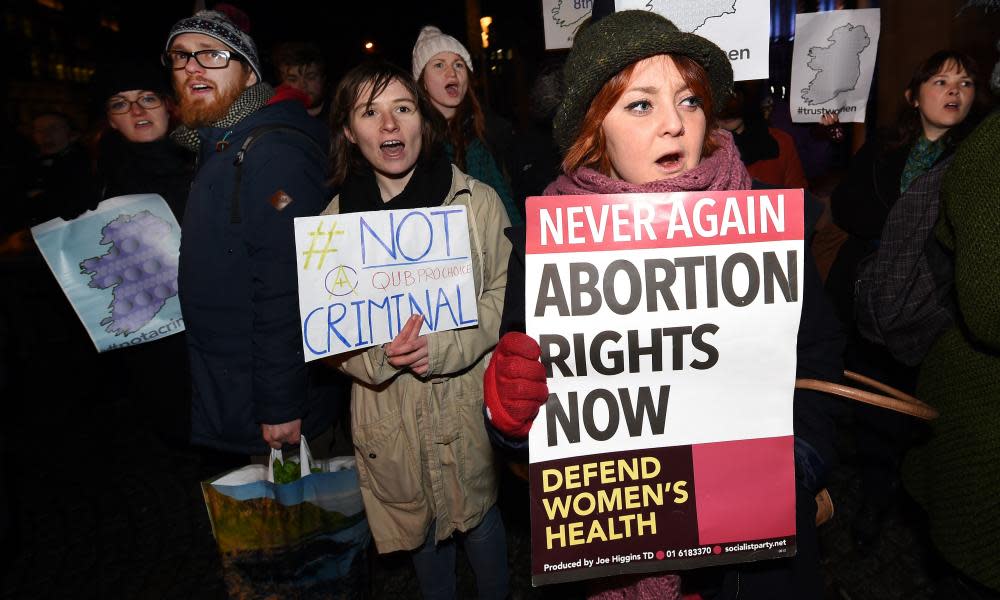If Northern Irish women can now have an abortion in England, why not here? | Goretti Horgan

Northern Ireland’s Department of Health has declined to issue new guidance on abortion to doctors and other health professionals because “there has been no change to the law on abortion”. This is despite the fact that the situation clearly has changed since women from the region can now access free, NHS abortions in England.
This stubborn refusal to recognise the reality of women’s reproductive healthcare needs is concerning because it ignores the fact that, at present, GPs in Northern Ireland are not permitted to purchase procedures outside Northern Ireland “that would be illegal in Northern Ireland”. This prohibition clearly needs to be updated to take account of the new situation.
Since the end of June, women from Northern Ireland can receive free NHS abortions through self-referral to the British Pregnancy Advisory Service or Marie Stopes; these agencies will then recoup the costs from the Equalities Office. Leaving aside the cost, financial and emotional, of having to travel for healthcare, this should work well for women who need an abortion mainly because they do not want to be pregnant.
But a small minority of women need, for medical reasons, to have their terminations in a hospital setting. With only 16 abortions carried out in Northern Ireland by health professionals in 2014-15 and again in 2015-16, clearly women with a range of health issues are not able to access legal abortions in Northern Ireland. Until now, they have had to take their chances in organising their own terminations at clinics that are not equipped to deal with serious medical conditions.
If nothing else, GPs need to be informed of care pathways through which these women can end their pregnancies in hospitals where all their medical needs can be met. It was to help such women that the idea of NHS-funded abortions for women from Northern Ireland first arose.
After the 1997 general election, hopes were high that the 1967 Abortion Act would be extended to Northern Ireland, particularly since both Tony Blair and Mo Mowlam, then secretary of state for Northern Ireland, had voted while in opposition for the extension of the act. However, it soon became clear that women’s rights were to be sacrificed to the “peace process”. Mowlam later admitted she “would have liked to have done something” for women in Northern Ireland but could not – for fear of “stirring up the tribal elders”.
Together with Voice for Choice, campaigners in Northern Ireland began to look at free NHS abortions as a stopgap measure that would reduce the inequality of access a little.
In February 1999, Maria Fyfe, then Labour MP for Glasgow Maryhill, wrote to Mowlam about abortion law in Northern Ireland. Adam Ingram, then a minister of state in the Northern Ireland Office, replied on Mowlam’s behalf on 10 March 1999. He wrote: “You raised the possibility of arrangements being introduced to enable GP fundholders and their purchasing authorities in Northern Ireland to fund terminations of pregnancy carried out elsewhere in the United Kingdom. I understand that such arrangements would not be possible in the case of fundholders who … are specifically prohibited from purchasing treatment for their patients outside Northern Ireland which would be illegal in Northern Ireland, such as termination of pregnancy.” (Of course, termination of pregnancy is the only treatment available in the NHS which would be illegal in Northern Ireland.)
Women in Northern Ireland continue to be discriminated against. Westminster cannot devolve human rights
The Northern Ireland assembly has shown itself incapable of dealing with the reality of abortion in the region. Debates have tended to be high on anti-abortion rhetoric and low on practical approaches to the reality of women’s lives in the 21st century. For almost 20 years now, Westminster has looked the other way. Indeed, a letter sent at the end of June from Justine Greening, the minister for women and equalities, to MPs – setting out the government’s proposal to provide NHS abortions to women from Northern Ireland – ended with an assurance that “none of this changes the fundamental position that this is a devolved issue in Northern Ireland … This announcement does not change that position”.
Women in Northern Ireland continue to be discriminated against. Westminster cannot devolve human rights; it remains the guarantor of such rights despite devolution. The (non-)response of the Northern Ireland Department of Health to the changed situation reinforces the view that Stormont is incapable of bringing women’s rights into the modern era and ensuring full reproductive healthcare in local hospitals.
The move to give everyone access to NHS abortions in Britain is a step in the right direction, but it is only the first step. Now Westminster needs to act to end half a century of inequality for women in Northern Ireland.
• Goretti Horgan is a lecturer in social policy at Ulster University and a founder member of Alliance for Choice in Northern Ireland

 Yahoo News
Yahoo News 
